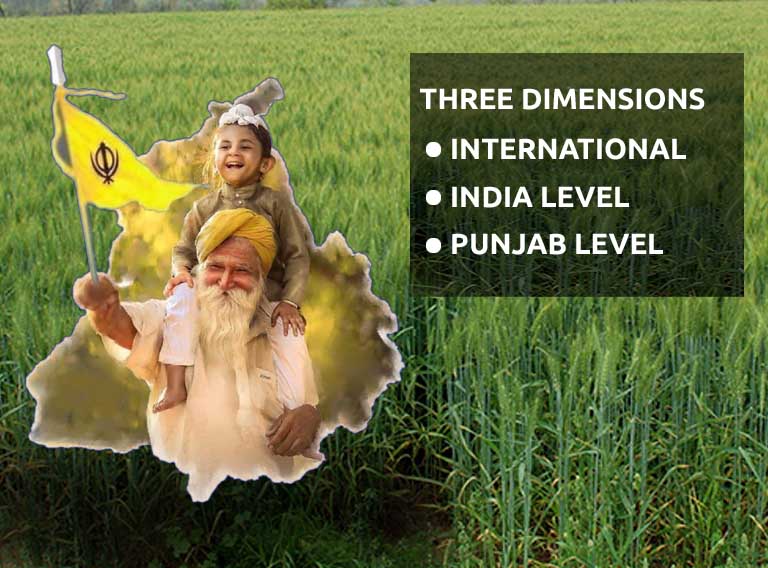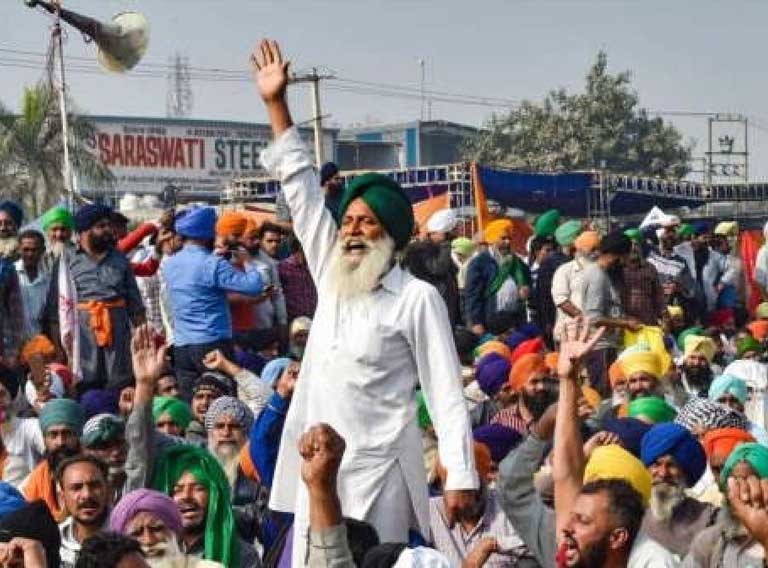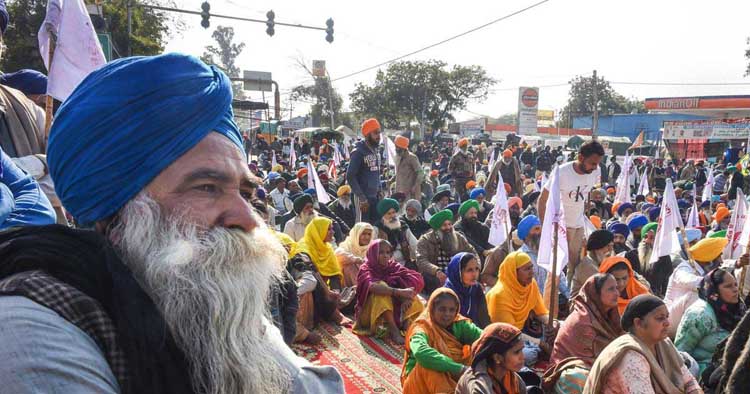Farm laws repealed, tasks ahead for Punjab farmers
After the Indian farmers’ movement achieved a historic victory in forcing the BJP government to repeal the three farm laws passed last year, Dr Pritam Singh, Professor Emeritus, Oxford Brookes Business School, Oxford, UK outlines three important dimensions, international, regional and Punjab-level, of the future tasks of the farmers’ movement in Punjab. At the level of Punjab, he seeks a people’s agenda and a common electoral approach for the forthcoming Punjab elections.
![After the Indian farmers’ movement achieved a historic victory in forcing the BJP government to repeal the three farm laws passed last year, Dr Pritam Singh, Professor Emeritus, Oxford Brookes Business School, Oxford, UK outlines three important dimensions, international, regional and Punjab-level, of the future tasks of the farmers’ movement in Punjab. At the level of Punjab, he seeks a people’s agenda and a common electoral approach for the forthcoming Punjab elections. TO WIT, ON THE INTERNATIONAL LEVEL, THE KEY TASK […]](https://www.theworldsikhnews.com/wp-content/uploads/2022/01/Farmers-win-360x266.jpg)
TO WIT, ON THE INTERNATIONAL LEVEL, THE KEY TASK for the farmers’ movement is of resisting global capitalism, nationally, it is against the centralisation of economic and political power, and internally within Punjab, it is for fighting for ecological and social egalitarianism.
At a global level, the agro-business corporations’ attack on agriculture, which was expressed through the three farm laws, was an expression of the general capitalist phenomenon of bringing all human labour and ecological resources in the ambit of capital accumulation. That global capitalist agenda and its Indian manifestation are still there, they have been pushed back but not defeated.
While the agenda of global and Indian agro-business corporations has faced a temporary setback, they would now be planning their counter-strategies to re-assert their power and control. The Indian farmers’ movement must grasp the reality that the world balance of power is currently not one of a revolutionary situation of overthrowing capitalism but to constantly track the global capitalist agenda and devise many long and patient struggles in alliance with movements of farmers, labourers, environmentalists and indigenous people in all parts of the world to resist the reach of global and Indian capitalism.

At a national level, apart from exerting constant pressure to get the remaining demands of the farmers’ movement including the one relating to MSP accepted, the critical task remains of fighting against continued centralisation of economic and political power in India and for federal devolution of powers and decision making. Linked to that task of struggling for federal decentralisation, is the medium-term task of fighting for a change in the current first past the post electoral system and for strengthening institutions of democracy.
It is the perversity of the first past the post electoral system, that the BJP by winning just over 30 per cent of the vote in the whole of India, has been able to win over 300 seats out of 543. The struggle for federalism and change to the proportional representation voting system would demand coordinated action with regional political parties principally against BJP which is totally committed to centralisation and first past the post electoral system but also against the Congress if it does not change itself in favour of federalism and proportional representation.

It is important to understand the contradictory role of MSP in the context of the national dimension of the task. While it has been the central demand of the farmers’ movement for an MSP to give reasonable income to farmers, it should be fought for but the danger of handing the power of setting the MSP for all crops to the Centre will further entrench centralisation. It should be viewed as a temporarily needed demand but in the long run, the demand should be to give the powers of setting and implementing MSP at the state level because each state government knows and understands best what crops are most suitable for each state. Agriculture as a state subject must be defended and central intrusion into agriculture must be opposed.
Within Punjab, the central task is to fight for an economic model that promotes ecological and social egalitarianism. The deepening of capitalist penetration in Punjab agriculture since the Green Revolution of the 1960s has adversely affected egalitarianism and social equality. The central intervention in Punjab agriculture was used by the Indian state to achieve the central government’s political and economic objective of achieving food self-sufficiency.

Punjabi farmers made economic gains temporarily for a few years, but the Green Revolution left long term damaging impacts on Punjab. Ecologically, the penetration of capitalism in Punjab agriculture led to viewing human labour and all forms of nature- land, water, mines, forests, animals and birds- as resources for exploitation for profit-making. This has led to a metabolic rift from nature with horrifying consequences in the form of the rise of the culture of violence against nature and human beings.
Violence against nature is reflected through deforestation, water exhaustion, land degradation and air pollution. This has led to a rise in illnesses and a worsening of quality of life. Rejecting violence against nature, respect for nature needs to be recaptured to create a sustainable economy and a healthy society.

Socially, the deepening of capitalism in Punjab has led to inequalities never seen before at this level. On one hand, it has led to a small elite becoming millionaires –crorepatis and arabpatis and on the other hand to the majority of the population driven into indebtedness, destitution and suicides. Gender and caste inequalities have also multiplied.
An agenda of redistribution of wealth, property and income in consonance with Baba Nanak’s ideal of Wand Chakna -sharing the fruits of labour and against maya is the need of the hour to build a socially just and peaceful Punjabi society. The culture of solidarity and shared togetherness –sanjhiwalta that developed during the farmers’ protest showed the potential that the negative features of capitalism can be resisted even if not fully removed. That culture and those progressive practices learnt during the struggle need to be strengthened and embedded in everyday life in Punjabi society to make them sustainable in the long run.
To achieve the fulfilment of tasks identified for Punjab, it is of central importance that the government that comes into power in 2022 is committed to these tasks. For this purpose, well thought out election strategy is of key importance.
BJP is crafting a counter-strategy to destroy the farmers’ movement by capturing power in Punjab so that a Sikh chief minister and a police chief on the pattern of Beant Singh-KPS Gill model during the Congress regime can be used against the farmers’ organisations.
At this moment, the prestige of farmers organisations and farmers leaders is at its peak. This goodwill needs to be reflected in the election outcome. The farmers’ organisation should agree between themselves that those who want to fight elections have valid reasons along with those who do not want to fight elections have rational reasons for not doing so. Despite these differences, a common Kisan Mazdoor List of 117 good quality candidates should be prepared with careful thinking for fighting the 2022 assembly elections. All organisations should support that list.
If the Kisan Mazdoor List wins the majority, it can form the government. If it does not win the majority, it can either be a part of a coalition government or in strong opposition status. Either way, the cause the farmers’ organisation fought for protecting Punjab agriculture from agro-business capitalist take over will be advanced through such an election outcome.
Despite these differences, a common Kisan Mazdoor List of 117 good quality candidates should be prepared with careful thinking for fighting the 2022 assembly elections. All organisations should support that list.
BJP is crafting a counter-strategy to destroy the farmers’ movement by capturing power in Punjab so that a Sikh chief minister and a police chief on the pattern of Beant Singh-KPS Gill model during the Congress regime can be used against the farmers’ organisations. Once Punjab’s farmers’ organisations are destroyed, the BJP is confident that the Indian farmers’ movement would be crippled. It may not succeed in its counter-strategy but the dangers it presents need to be fully understood to defeat it.
Protecting agriculture from global capitalist takeover is the future of protecting humanity from ecological catastrophe. Punjab needs to be the pioneer in crafting economic, political, social and cultural strategies to realise that goal of protecting agriculture, nature and humanity.
The Punjabi iteration of this article was first published in the Punjabi Tribune.
 Dr Pritam Singh has a DPhil from the University of Oxford and is Professor Emeritus at Oxford Brookes Business School. He is the author of ‘Federalism, Nationalism and Development: India and the Punjab Economy.’ In June 2015, he was awarded the Distinguished Achievement Award in Political Economy For The Twenty-First Century by the World Association of Political Economy at its Tenth Forum held at Johannesburg, South Africa, and in May 2021, the University of California (Riverside) honoured him with a ‘Lifetime Achievement Award for his distinguished contribution to the Punjab Research Group in the UK to promote Sikh and Punjab Studies.’
Dr Pritam Singh has a DPhil from the University of Oxford and is Professor Emeritus at Oxford Brookes Business School. He is the author of ‘Federalism, Nationalism and Development: India and the Punjab Economy.’ In June 2015, he was awarded the Distinguished Achievement Award in Political Economy For The Twenty-First Century by the World Association of Political Economy at its Tenth Forum held at Johannesburg, South Africa, and in May 2021, the University of California (Riverside) honoured him with a ‘Lifetime Achievement Award for his distinguished contribution to the Punjab Research Group in the UK to promote Sikh and Punjab Studies.’
